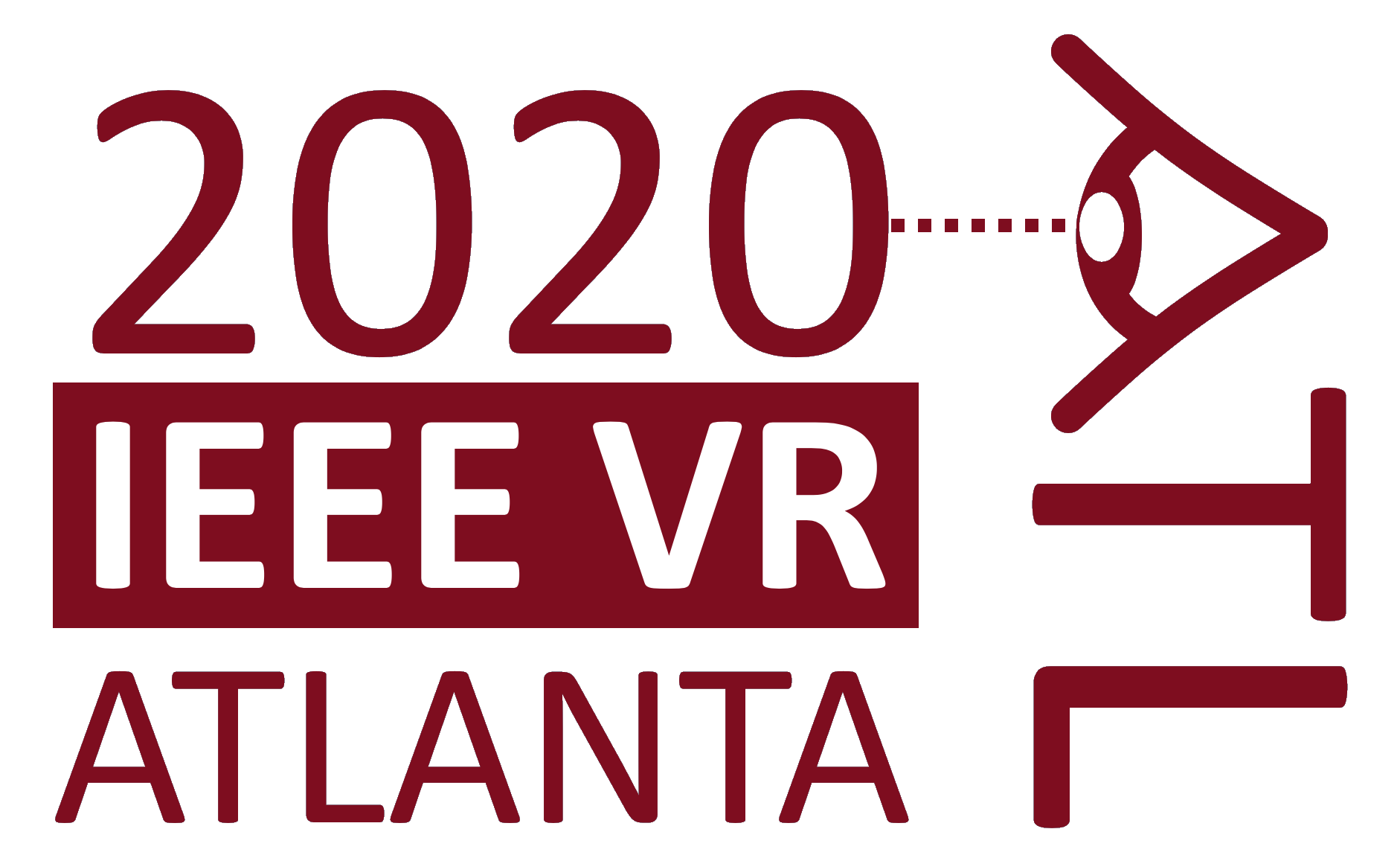
March 22nd - 26th

March 22nd - 26th
Conference Sponsors:
Gold

University of Georgia
Silver

Georgia Institute of Technology
Bronze
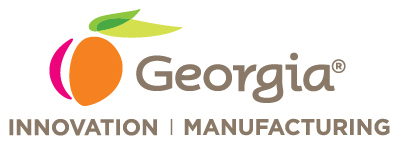
The Center of Innovation for Manufacturing - Georgia Institute of Technology
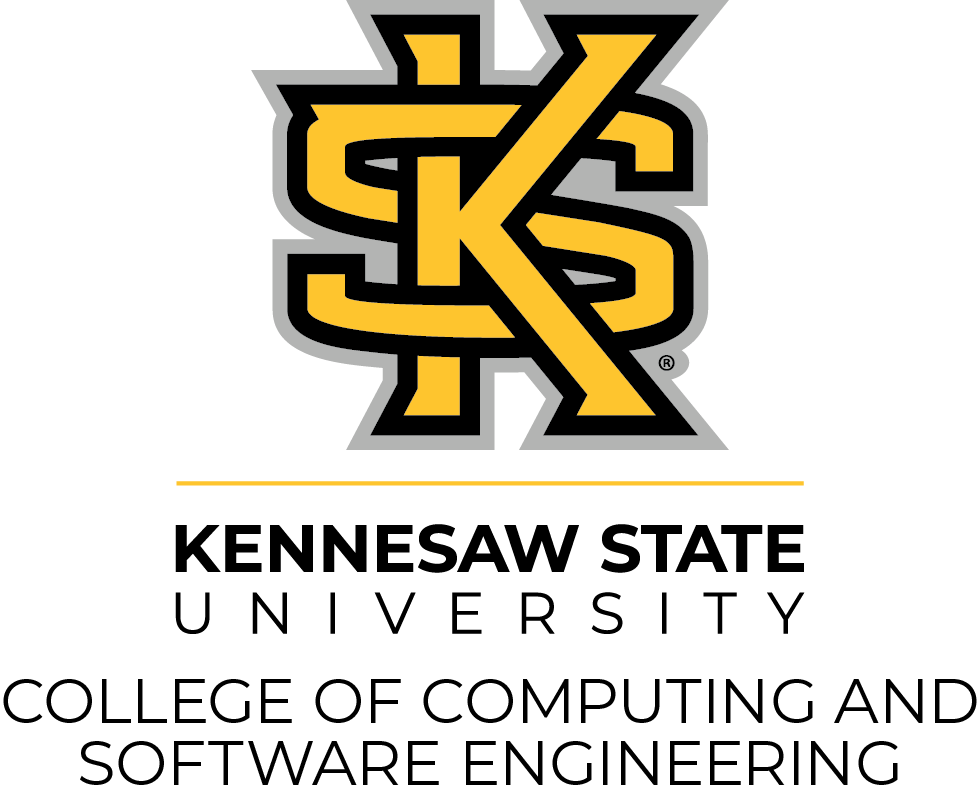
Kennesaw State University

Mozilla

Microsoft Research, Altspace and Mixed Reality

Amazon Web Services
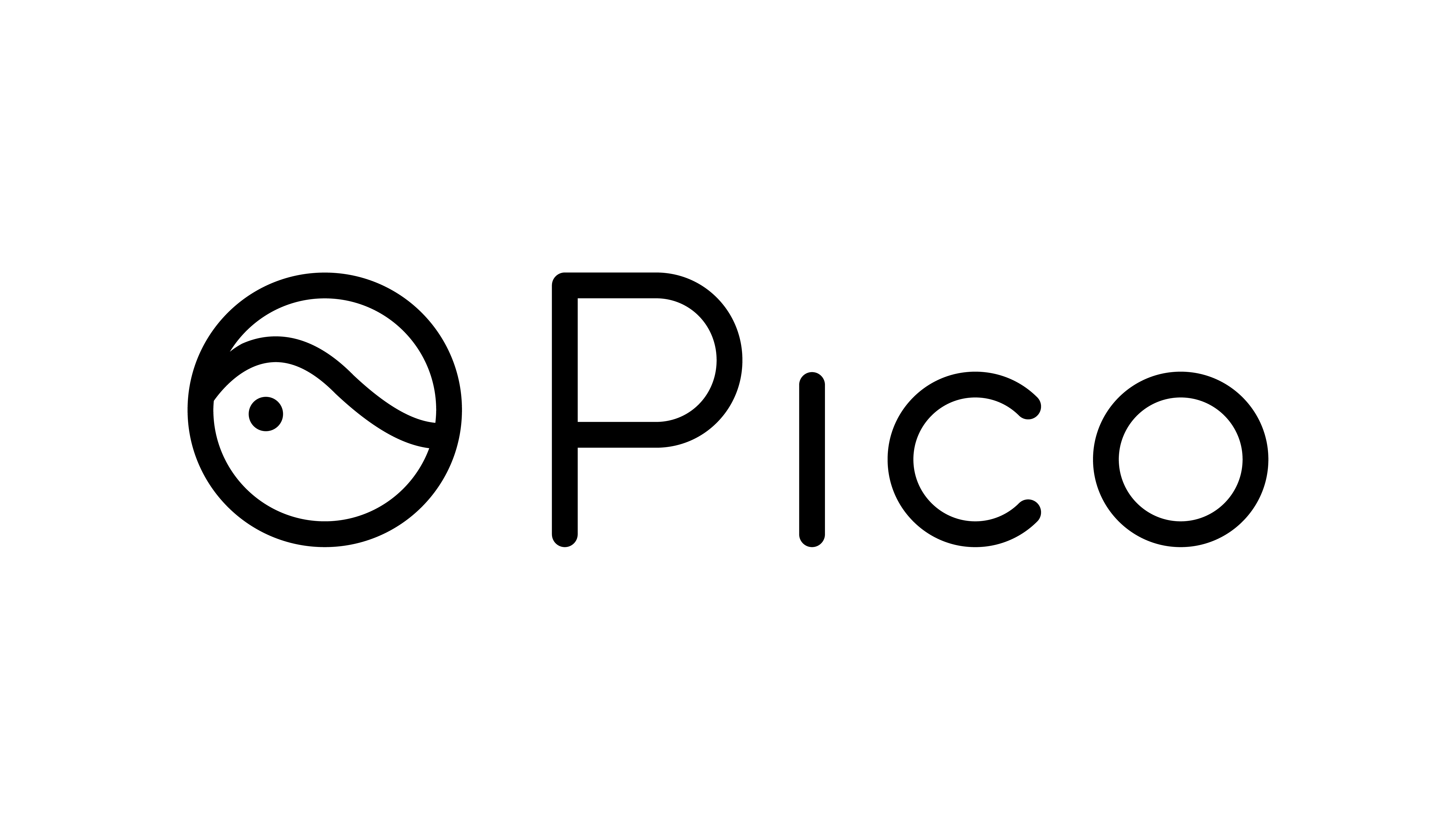
Pico Interactive
Supporter

Emory University
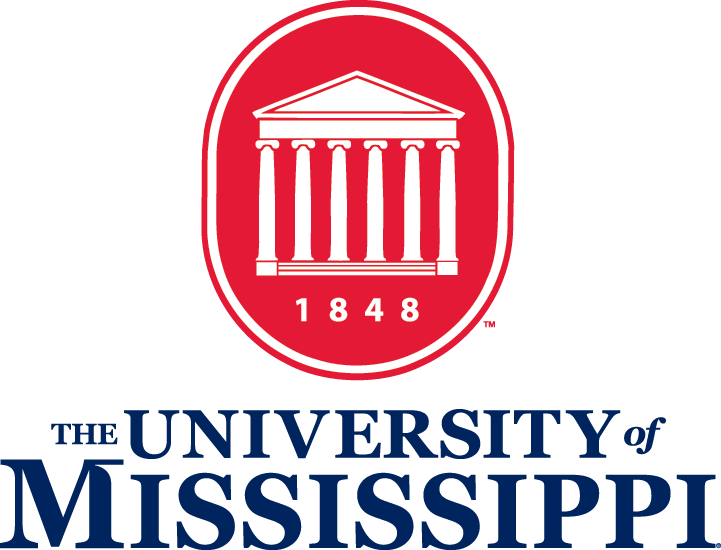
University of Mississippi

Vimeo
Doctoral Consortium Sponsors:

National Science Foundation
Contest Sponsors:

Fakespace Labs
Exhibitors and Supporters
Workshops
The following 12 workshops will be held at IEEE Virtual Reality 2020. The workshops will be held on two days, March 20 and March 22.
March 22
- VR in VR: Workshop on Virtual Conferencing
- NIDIT: Workshop on Novel Input Devices and Interaction Techniques
- Training XR: Workshop on 3D Content Creation for Simulated Training in eXtended Reality
- VHCIE: Workshop on Virtual Humans and Crowds in Immersive Environments
- ANIVAE: 3rd Annual Workshop on Animation in Virtual and Augmented Environments
- PERCAR: 6th Annual Workshop on Perceptual and Cognitive Issues in AR
- SEARIS: 13th Annual Workshop on Software Engineering and Architectures for Realtime Interactive Systems
- SeatedVR: Workshop on Seated Virtual Reality
- WEVR: 6th Annual Workshop on Everyday Virtual Reality
- SIVE: 5th Annual Workshop on Sonic Interactions in Virtual Environments
- KELVAR: 5th Annual Workshop on K-12+ Embodied Learning through Virtual and Augmented Reality
- WISP: 2nd Annual Workshop on Immersive Sickness Prevention
NIDIT: Workshop on Novel Input Devices and Interaction Techniques
Date: March 22nd, 9:00AM-5:30PM
Website: https://sites.google.com/view/nidit
- Abstract Submission - January 15, 2020
- Submission - January 27, 2020
- Notification - January 31, 2020
- Camera ready - February 14, 2020
Virtual reality has finally become a mainstream technology. Recent advances in commercial VR hardware have led to high-resolution, ergonomic, – and critically – low cost head-mounted displays. Advances in commercial input devices and interaction techniques have arguably not kept pace with advances in displays. For instance, most HMDs include a tracked input device: “wands” that are not dissimilar to the earliest examples of 3D controllers used in the VR systems of the 1980s. Interaction in commercial VR systems has similarly lagged; despite many advances in 3D interaction in the past three decades of VR research, interaction in commercial systems largely relies on classical techniques like the virtual hand, or ray-casting. This full-day workshop will bring together researchers and industry practitioners to discuss and experience the future of input devices for VR, AR, and 3D User Interfaces, and help chart a course for the future of 3D interaction techniques. In addition to a presentation at the workshop authors of all accepted submissions will be strongly encouraged to demonstrate their novel input device and interaction techniques in an interactive demo format following presentations.
Organizers:
- Robert J. Teather (rob.teather@carleton.ca)
- Francisco R. Ortega (fortega@colostate.edu)
- Adalberto L. Simeone
Training XR: Workshop on 3D Content Creation for Simulated Training in eXtended Reality
Date: March 22nd, 9:00AM-5:30PM
Website: https://sites.google.com/view/trainingxrieeevr2020/trainingxr
- Submission - January 22, 2020
- Notification - January 31, 2020
- Camera ready - February 10, 2020
This workshop discusses and articulates research visions on using the latest extended reality (VR/AR/MR) technologies for education and training purposes, and on creating immersive 3D virtual content for delivering effective and personalized training experiences. This workshop will gather researchers and practitioners in a variety of computer disciplines related to XR training and content creation. This workshop will accept research papers on these topics. We will also invite renowned speakers from the research community and the industry to give talks related to XR-based training, to inspire the field to further explore this promising direction.
Organizers:
- Lap-Fai (Craig) Yu (craigyu@gmu.edu), George Mason University
- Christos Mousas (cmousas@purdue.edu), Purdue University
- Rawan Alghofaili (ralghofa@gmu.edu), George Mason University
- Haikun (Quincy) Huang (haikun.huang001@umb.edu), University of Massachusetts Boston
VHCIE: Workshop on Virtual Humans and Crowds in Immersive Environments
Date: March 22nd, 2:00PM-5:30PM
Website: https://sites.google.com/view/vhcieieeevr2020/home
- Submission - January 12, 2020
- Notification - January 30, 2020
- Camera ready - February 13, 2020
Recently many tools, including algorithms and systems, have made it easier to populate immersive virtual environments (VEs) with autonomous characters. Today it is common to explore virtual environments that can reach the size of an entire city that can be populated by many thousands of virtual characters. Through both invited and contributed presentations, we will:
- Present state of the art character and crowd animation techniques for interactive characters. Recent developments in character animation as well as crowd animation has impressively improved the level of quality for motions, as well as computational performances. One objective of the workshop is to present how VR and immersive environments can benefit from these recent developments.
- Present some examples of new research opportunities by the availability of populated virtual environment. Populating VEs with several autonomous characters is a relatively recent advancement. What research can benefit from such capability? Our call for contributions to the workshop will explore this question. We see possibilities for socio-psychology research on crowd behaviors or treatment of social phobia. We expect presentations related to how recent technological progresses enable or facilitated such research.
- Present new research on avatars. The user is able to move and interact with virtual humans but what is the best way to represent the user to improve its experience in the virtual environment?
- Discuss technological requirements for future applications. Recent technologies and software have clearly eased the creation of populated immersive VEs. One final objective of the workshop is to gather the requirements of current users of these technologies for future applications. Do they expect better animation quality? Better rendering? Or, higher level of autonomy? What kind interactivity is expected with autonomous characters?
Organizers:
- Ming Lin, University of Maryland, USA, lin@umd.edu
- Anne-Hélène Olivier, University of Rennes, France anne-helene.olivier@univ- rennes2.fr
- Julien Pettré, Inria Rennes, France, julien.pettre@inria.fr
ANIVAE: 3rd Annual Workshop on Animation in Virtual and Augmented Environments
Date: March 22nd, 9:00AM-12:30PM
Website: https://anivae.fhstp.ac.at/
- Submission - January 15, 2020
- Notification - January 31, 2020
- Camera ready - February 10, 2020
The overall goal of the workshop is to identify the chances and challenges of animated content in AVR environments. It focuses on application-oriented contexts, such as industry, education, health or architecture, creating direct benefits for end users and/or customers. The workshops aims to create an open environment, connecting specialists from various digital humanities research areas, such as animation, games and media studies with experts from both vision oriented computer science such as computer graphics or information visualization, as well as experts from technically-oriented computer science areas such as data integration, internet-of-things or smart automation. By encouraging synergies of interdisciplinary approaches the workshop maps animation within the AVR context from different angles and creates new knowledge in this research field.
Organizers:
- Thomas Moser, St. Pölten University of Applied Sciences
- Franziska Bruckner, St. Pölten University of Applied Sciences
PERCAR: 6th Annual Workshop on Perceptual and Cognitive Issues in AR
Date: March 22nd, 9:00AM-12:30PM
Website: https://sites.google.com/view/percar2020/
-
Submission - January 17, 2020 - EXTENDED Submission - January 31, 2020
- Notification - February 7, 2020
- Camera ready - February 14, 2020
We expect researchers to submit early work, such as initial analyses of user studies or experimental visualization techniques, although position papers that comprise several pages and summarize a range of previous experiments or experiences (survey) also fall inside the scope of the workshop. Papers should be between 2 and 4 pages in length (excluding references) and may cover one or more of the following topics:
- Depth perception in AR
- Color perception issues
- Issues related to visual search / information processing
- Situational awareness
- Studies related to selective, focused or divided attention
- Just noticeable differences, signal thresholds, and biases
- Individual differences in perception & cognition
- Comparisons between AR and VR perceptual issues
- Cognitive load, mental workload or other cognitive issues related to perception
- Multisensory issues (sensation, perception & cognition in non-visual AR)
- Visualization techniques addressing perceptual or cognitive issues
- View management techniques
- Novel visual display devices that target specific perceptual issues
- Validation methodologies, benchmarks and measurement methods, including eye tracking
- Novel capturing and processing techniques (like HDR) that address perceptual issues
- Techniques for conducting longitudinal studies Submitted papers will be evaluated through a double blind reviewing process of the submissions by the PC committee members.
Organizers:
- Joe Gabbard, Virginia Tech, USA
- Kiyoshi Kiyokawa, Nara Institute of Science and Technology, Japan
- Ernst Kruijff, Hochschule Bonn-Rhein-Sieg, Germany
- Richard Skarbez, La Trobe University, Australia
- Ed Swan, Mississippi State University, USA
SEARIS: 13th Annual Workshop on Software Engineering and Architectures for Realtime Interactive Systems
Date: March 22nd, 2:00PM-5:30PM
Website: https://www.searis.net/
- Abstract Submission - January 31, 2020
- Notification of Presentation - February 3, 2020
- Paper submission - February 10, 2020
- Notification of Publication - March 9, 2020
- Camera ready - March 16, 2020
- Workshop - March 22, 2020
SEARIS provides a forum for researchers and practitioners working on the design, development, and support of realtime interactive systems (RIS). These systems span from Virtual Reality (VR), Augmented Reality (AR), and Mixed Reality (MR) environments to novel Human-Computer Interaction systems (such as multimodal or multitouch architectures) and entertainment applications in general. Their common principle is a strong user centric orientation which requires real-time processing of simulation aspects as well as input/output events according to perceptual constraints. Therefore, we encourage researchers and developers of real-time human computer interaction systems of all flavors to share their experiences and learn from each other during this workshop.
Organizers:
- Marc Erich Latoschik, University of Würzburg, Germany
- Jean-Luc Lugrin, University of Würzburg, Germany
- Dirk Reiners, University of Arkansas, Little Rock, USA
- Pablo Figueroa, Universidad de los Andes, Bogota, Colombia
SeatedVR: Workshop on Seated Virtual Reality
Date: March 22nd, 9:00AM-12:30PM
Website: https://sites.google.com/view/seated-vr/home
- Submission - January 27, 2020
- Notification - January 31, 2020
- Camera ready - February 12, 2020
Accessing VR/AR while the user is being seated is not uncommon. However, sitting often is not recognized as a unique characteristic and instead is somehow addressed in the background, or it is perceived as just given, because it often also is not a design decision to make, and thus does not generate attention. Furthermore, whenever being seated really is a choosable option, it might look only limiting at first glance, but reveals various opportunities at a second. In the end, the reason for being seated are diverse and could be dictated by the surrounding real-world environment, beneficial for long term usage and ergonomics, necessary due to impairment, matching the simulated real-world activity, laziness, convenience. However, the impact and questions on the UI design as well as the user’s perception often are the same. Therefore, we think it is worth to combine research around this topic and bringing interested researchers together, to identify and discuss research and lack of such in this field. In this interactive workshop we want to tackle this agenda in lively group work and discussions, framed by short lightning talks of the accepted abstracts.
Organizers:
- Daniel Zielasko, University of Trier, zielasko@uni-trier.de
- Bernhard Riecke, School of Interactive Arts and Technology (SIAT), Simon Fraser University, b_r@sfu.ca
WEVR: 6th Annual Workshop on Everyday Virtual Reality
Date: March 22nd, 9:00AM-5:30PM
Website: https://wevr.adalsimeone.me
- Abstract Submission - January 17, 2020
- Submission - January 24, 2020
- Notification - January 31, 2020
- Camera ready - February 14, 2020
Traditionally, Virtual and Augmented Reality have been conceived for purpose-built highly instrumented laboratories. However, the commercial release of consumer grade Virtual and Augmented Reality head-mounted displays has allowed a wider user base to experience VR and AR in everyday environments such as their own home or work environments. If consumer VR and AR is to evolve beyond the laboratory, a rethinking of the way we design and implement interactive VR and AR systems for these environments application scenarios is needed.
The WEVR workshop will cover “Everyday” Virtual, Augmented and Mixed Reality research themes in all those contexts and scenarios other than research laboratories and specialist environments. This half-day workshop will bring together researchers and industry practitioners to explore these new challenges and define a new research agenda. We invite authors to submit 4-page position papers, preliminary research results, novel concepts or case studies (up to a maximum of 6 pages).
Organizers:
- Adalberto L. Simeone, KU Leuven
- Benjamin Weyers, University of Trier
- Christoph W. Borst, University of Louisiana at Lafayette
- Rob Lindeman, University of Canterbury
SIVE: 5th Annual Workshop on Sonic Interactions in Virtual Environments
Date: March 22nd, 2:00PM-5:30PM
Website: https://sive.create.aau.dk/
- Abstract Submission - January 3, 2020
- Submission - January 10, 2020
- Notification - January 31, 2020
- Camera ready - February 14, 2020
Sonic interaction design is defined as the study and exploitation of sound as one of the principal channels conveying information, meaning, and aesthetic/emotional qualities in interactive contexts. This field lies at the intersection of interaction design and sound and music computing. In the virtual reality community, the focus on research in topics related to auditory feedback has been rather limited when compared, for example, to the focus placed on visual feedback or even on haptic feedback.However, in communities such as the film community or the product sound design community it is well known that sound is a powerful way to communicate meaning and emotion to a scene or a product.
The main goal of this workshop is to increase among the virtual reality community the awareness of the importance of sonic elements when designing virtual/augmented/mixed reality environments (XR hereafter). We will also discuss how research in other related fields such as film sound theory, product sound design, sound and music computing, game sound design and computer music can inform designers of XR environments. Moreover, the workshop will feature state of the art research on the field of sound for XR environments.
Organizers:
- Michele Geronazzo, Aalborg University Copenhagen
- Stefania Serafin, Aalborg University Copenhagen
- Cumhur Erkut, Aalborg University Copenhagen
- Niels Christian Nilsson, Aalborg University Copenhagen
- Rolf Nordahl, Aalborg University Copenhagen
- Francesco Grani, HERE Technologies GmbH
- Federico Avanzini, University of Milano
KELVAR: 5th Annual Workshop on K-12+ Embodied Learning through Virtual and Augmented Reality
Date: March 22nd, 9:00AM-12:30PM
Website: https://sites.google.com/site/vrkelvar/vr2020
- Abstract Submission - January 14, 2020
-
Submission - January 21, 2020 - EXTENDED Submission - January 31, 2020
-
Notification - January 31, 2020 - Notification - February 7, 2020
- Camera ready - February 14, 2020
K-12+ (K-12 and higher ed) education is currently undergoing a technological revolution creating opportunities for Virtual-, Augmented-, and Mixed-Reality based learning (hereafter referred to as XR (extended reality) technologies. Technology integration will continue to increase as mobile devices penetrate all socioeconomic strata, and as XR technologies become affordable to schools, vocational education providers, universities, and informal educational settings. These technologies have the potential to facilitate effective learning by: developing the ability to engage students of all ages with interactive 3D simulations of real-life and artificial phenomena; presenting information that is spatially- and temporally- integrated with real objects; leveraging whole-body motions to depict and reinforce learning content. However, there are many questions about the integration of such experiences into the classroom, such as: What curriculum topics might be addressed through XR technologies?; What socio-cultural, psychological and physiological mechanisms underlie embodied cognition?; How can we design experiences that are appropriate for the different stages of human development?; How will pedagogical approaches be influenced by such technologies?
In this workshop we aim to bring together educators, developers and researchers who are interested in creating and deploying XR technologies for the educational contexts of the future. The workshop will enable participants to discuss and engage with different approaches for designing and integrating XR technologies with a specific focus on the challenges and potential for embodied learning in the classroom for K-12, vocational and higher education.
Organizers:
- Steven Cutchin, Boise State University (stevencutchin@boisestate.edu)
- Erica Southgate, University of Newcastle, Australia (erica.southgate@newcastle.edu.au)
- Francisco R. Ortega, Colorado State University (fortega@colostate.edu)
- Jerry Alan Fails, Boise State University (jerryfails@boisestate.edu)
- Iulian Radu, Harvard University (iulian_radu@gse.harvard.edu)
- Manoela M. O. da Silva, Federal University of Pernambuco, Brazil (mmos@cin.ufpe.br)
WISP: 2nd Annual Workshop on Immersive Sickness Prevention
Date: March 22nd, 2:00PM-5:30PM
Website: https://sites.google.com/umn.edu/wisp
- Submission - January 31, 2020
- Notification - February 7, 2020
- Camera ready - February 14, 2020
Cybersickness remains one of the most significant challenges facing the virtual reality industry. Although immersive technologies have been advancing rapidly, their rate of public adoption has been slowed by the fact that many users experience physical discomfort during or after the use of VR devices, with symptomatic characteristics similar to motion sickness. Furthermore, studies have consistently shown that motion sickness disproportionately affects women, and concerns have been raised about the existence of inequitable barriers for engaging with immersive media.
The Workshop on Immersive Sickness Prevention is intended to foster discussion between researchers, developers, and practitioners interested in addressing one of the most significant usability issues in the virtual reality field. We are soliciting primary research papers (4-8 pages) describing studies, novel interaction techniques, or technological interventions aimed towards understanding and mitigating cybersickness for users of immersive systems. We also welcome position papers (up to 2 pages) describing early-stage concepts, preliminary results, or case studies from industry.
Organizers:
- Evan Suma Rosenberg, University of Minnesota, suma@umn.edu
- Victoria Interrante, University of Minnesota, interran@umn.edu
VR in VR: Workshop on Virtual Conferencing
Date: March 22th, 9:00AM-12:30PM
Website: https://sites.google.com/view/vrinvr2020
- Submission - January 31, 2020
- Notification - February 4, 2020
- Camera ready - February 12, 2020
In recent years, academic and non-academic communities are taking the climate impact of flying more seriously, from the anti-flying movement known as “flight shame” - or flygskam in Swedish, where the movement began - to the “flying less” movement in academia (https://academicflyingblog.wordpress.com). Travel for academic conferences has an impact on the environment and also prevents access for certain groups.
The VR community is well placed to take a lead in developing alternatives to the face to the conference because our community has a long history of implementing and evaluating key pieces of collaborative technology that might facilitate new types of online meeting. It is perhaps time to ‘eat our own dogfood’ and start to plan a substantive future for the IEEE VR Conference that is online.
With VR technology we can reduce flying by supporting virtual conferencing, from pure virtual conferences to remote attendance at physical conferences to providing the glue that supports multi-site events. Beyond climate impact, remote and distributed conferences offer the potential for many more people to get the benefits of attending academic conferences they would not otherwise have access to, due to personal, financial or political constraints.
Organizers:
- Blair MacIntyre, Georgia Tech
- Anthony Steed, University College London
- Rob Lindeman, University of Canterbury
